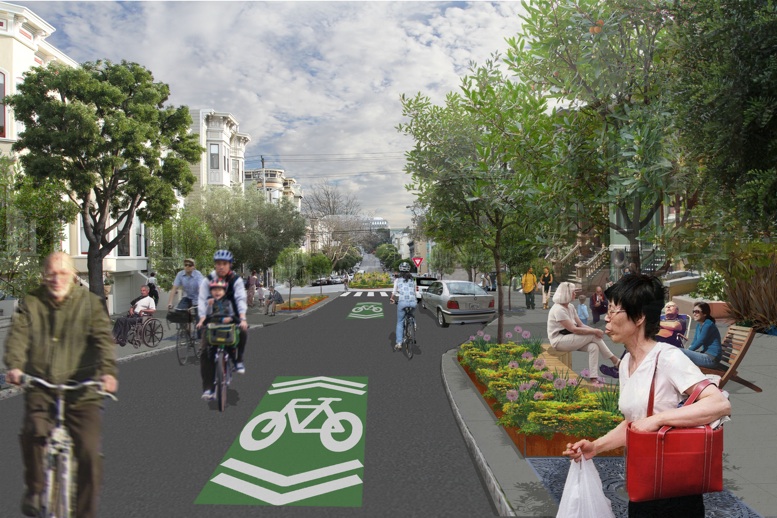The SFMTA held a public meeting last week about how to calm traffic on three blocks of Scott Street along the Wiggle. On the table are design features that would signal drivers to slow down and possibly prevent them from using the street as a cut-through route. Even though planners say the project may remove few, if any, parking spaces, a familiar handful of pro-car activists showed up to fume about the agency's livable streets projects in general.
The SFMTA held the meeting to get feedback on various treatments to slow car and bicycle traffic on Scott -- and there was consensus among attendees that slower traffic was needed to make the street more comfortable for pedestrians, particularly as growing numbers of bike commuters use the crosstown route. Treatments on the table include traffic diverters, which filter out motor vehicle through-traffic but allow for free-flowing bicycle and pedestrian movement and retain access for local car trips. Also under consideration are raised crosswalks, roundabouts and bulb-outs with greenery, and other design changes that calmed residential streets in other cities but aren't widespread in San Francisco.
"As we've been looking into this, we definitely find that there are some [characteristics] that make [Scott] a good candidate to do something a little bit different," said Miriam Sorrell, a planner at the SFMTA's Livable Streets subdivision.
Most residents said that crossing streets around the Wiggle was often an uncomfortable experience, and some welcomed a significant change to the status quo. But a few people criticized the diverters because car owners would have to change their routes to access their block when driving, and seemed to believe that most residents own cars (which is not supported by census data).
When the meeting opened up for comments, Jung O'Donnell stood up to loudly denounce what she perceives as the SFMTA's "war on cars" that she sees as essential to family life: "It makes it so much harder for people like me to live in the city when you're so anti-car," O'Donnell told SFMTA staffers. She did not refer specifically to the Scott project.
O'Donnell complained primarily about the recently-approved and funded redesign on Masonic Avenue, where pedestrian safety improvements, greening, raised bike lanes, and fewer motor traffic lanes are poised to reduce injuries on a street where studies show parking occupancy is generally low. Even though the plan would remove all parking on that stretch of Masonic, the plan was chosen with broad support at an extensive series of community meetings. Flyers were recently posted on Masonic mocking the rhetoric from the group trying to stop the plan.
"I know the Bicycle Coalition has five well-paid executives who are there lobbying, and that's wonderful, but think about the people who live here too," said O'Donnell, eliciting applause from some attendees.
O'Donnell was among a handful of speakers who have protested against other projects like the bike lanes and pedestrian safety improvements on Polk, Fell and Oak Streets, and the expansion of parking meters in the eastern neighborhoods. Others included Howard Chabner and Ted Lowenberg, who filed an appeal against the Fell and Oak plan, and Robert Francis, who makes a plethora of unsupported claims about SFPark’s motives on his misleadingly labeled website, SFPark.info.
Not all attendees were so opposed to changes like traffic diverters if it would make the street more livable. One man, who noted that he didn't ride a bike himself, said he welcomes the increase in bicycle traffic because "bicycling is a way to help solve some of the city's problems," though it has to work well for the pedestrian environment, too.
Beverly Best, who bikes, drives, and lives on Page Street between Scott and Piece Streets, said she favored "something on the more aggressive side at Page and Scott, diverting [traffic] both ways."
"We've got to slow it down," she said.
Planners from the SFMTA and the Netherlands sketched out a conceptual idea for redesigning Scott as part of the ThinkBike workshops in September 2011. That proposal included many of the features which the SFMTA is considering now, including restricting some blocks to one-way car traffic.
Street improvements on Scott would be incorporated into the broader Wiggle project lead by the SFMTA and the SF Public Utilities Commission.






